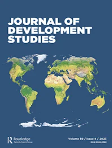The Journal of Development Studies Vol. 0, No. 0, 1–16
While much knowledge is being generated on the impact of the pandemic, we still know very little on its implications on taxation in lower-income countries. Yet, tax is crucial to fund crisis response and recovery, in addition to broader development plans and expanded government expenditure. This paper starts addressing this gap using an unique dataset of survey data from Rwanda. We document two significant shifts in taxpayers’ views during the pandemic: perceptions about the fairness of the tax system improve by 40 per cent, and their attitudes to compliance become more conditional on the provision of public services of sufficiently good quality. We put these results in the broader context of crisis response. We show that they are not simply linked to individual experiences of the crisis or access to relief, but they are more likely linked to generalised improvements in solidarity and patriotism.
